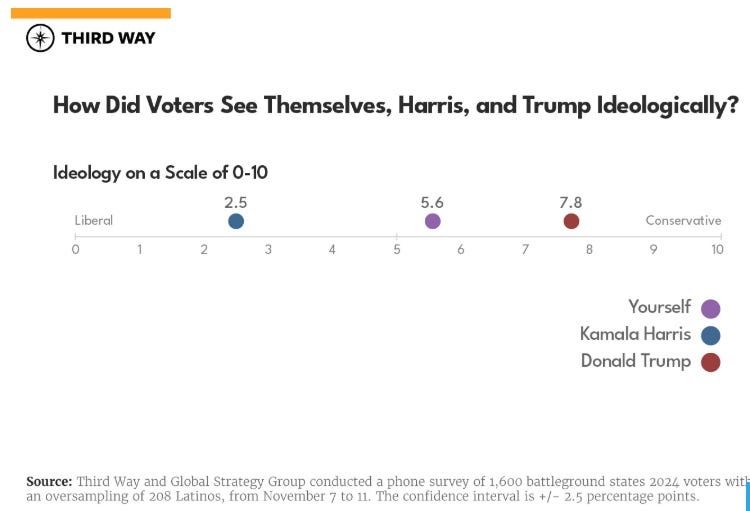Democrats need to loudly reject progressive extremism
Ignoring it just isn't enough.

I feel like I have a shrinking window to criticize Democrats and progressives before Trump takes over. Once the GOP dominates the presidency and both houses of Congress, their policies and their mistakes will (quite rightfully) take center stage, and long-term adjustments by the opposition will become a low-key, back-burner discussion. I’ve already criticized Democrats’ use of targeted racial appeals to try to win over minority voters, their focus on unemployment over inflation, their overreliance on the educated professional class, and their misgovernance of large cities. That’s a lot of criticism already! I don’t want to give the impression that I think Dems do everything wrong. But there’s one more thing I’ve been feeling like I should write about, and it’s about how Democrats relate to the progressive activist movement.
One interesting and very dismaying thing about the 2024 election was how despite Kamala Harris’ rhetorical move to the center, the American public thought of her as far to the left of them. Here’s a poll by Third Way:

Now, maybe Third Way are a bunch of centrists and we shouldn’t trust their polling. But here’s Blueprint 2024 with an even more damning finding:
Over 80% of swing voters who chose Trump believed Harris held positions she didn’t campaign on in 2024, including supporting taxpayer funding for transgender surgeries for undocumented immigrants (83%), mandatory electric vehicles by 2035 (82%), decriminalizing border crossings (77%), and defunding the police (72%).
For someone like me who strongly supported Harris and approved of her move to the center, this is absolutely maddening. The voters barely even registered Harris’ centrism at all; they just thought of her as a far left ideologue. Why?
One reason might be that Harris just didn’t have enough time to execute her pivot. She took over from Biden late in the election season, and only had a couple of months to define herself to a somewhat tuned-out electorate. Harris actually did run as an extremely “woke” candidate back in the 2019-20 primary season, praising the “defund the police” movement and saying other similar stuff. And her voting record as a senator was one of the most progressive. Personal reinventions take a very long time, and Harris just got started very late.
But I think another likely reason is that while Harris and the other Dems pivoted to the center in 2024, they didn’t do nearly enough to distance themselves from the progressive activist movement that dominated much of American social life in 2014-2021. Like it or not, social media has changed the game of politics — thanks to Instagram, TikTok, and X, the average American is in far more frequent contact with grassroots activists and ideological extremists than in 2008 or 1992. In those earlier times, the average voter’s most important contact with the Democrats was watching a politician on TV, or maybe reading an op-ed in the paper. Now, it’s being yelled at by an activist on social media.
Also, the progressive activists of the 2010s and early 2020s didn’t stay on social media. While both the Right and the Left became very extreme in the 2010s, there was an asymmetry in terms of people’s contact with the two extremes. Rightism stayed mostly online, occasionally spilling over into a mass shooting or some other high-profile terrorist attack (or the January 6th attack). But while progressive extremism lacked those fearsome and spectacular acts, it was far more pervasive — most Americans came into contact with it, in their workplaces or on the street.
I think it’s the memory of that era of grassroots, everyday extremism that some Americans were reacting against by voting for Trump. And to those voters, Democrats’ pivot to the center in 2024 probably seemed like an attempt to quietly memory-hole the progressive era instead of explicitly rejecting the harm that many Americans suffered.
The long shadow of summer 2020
This post was actually inspired by a conversation I had in San Francisco’s Chinatown the other day.
I was wandering through various shops, when one proprietor struck up a conversation with me, eager to tell me about the history of Chinese Americans and Chinatown. He started off by telling me about how in the days of the Gold Rush, White “cowboys” would kill Chinese miners for fun. “That’s part of American history you never learned in school!”, he said.
But then he suddenly switched to telling me about a much more recent piece of American history. He started talking about the summer of 2020, and how Chinese-owned businesses had suffered during the Black Lives Matter protests. He took great care to distinguish between the protesters themselves (“They were just expressing their beliefs, that’s fine”) and the looters who took advantage of the reduced police presence to ransack Chinatown’s jewelry stores. Then he told me about when the looters tried to invade and attack the homes above the stores, and how the residents threw furniture down the stairwells to block the looters from getting in. “That’s something you didn’t see on the news,” he said, in the same rueful voice he had used when talking about the murderous 19th century cowboys.


